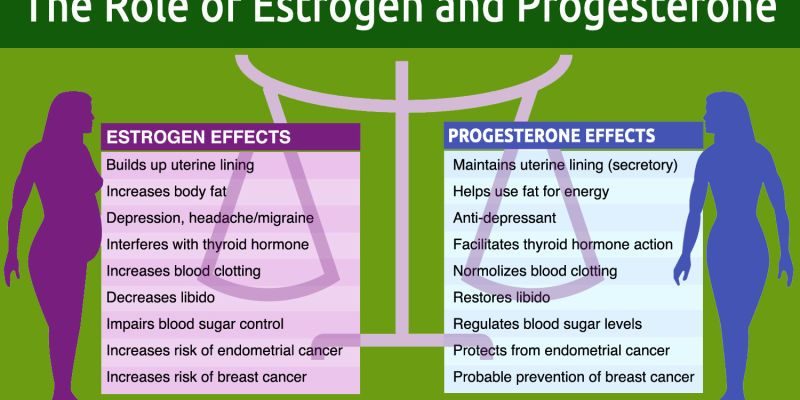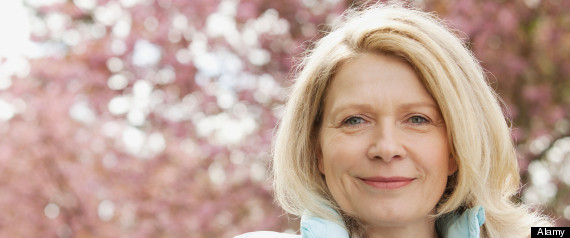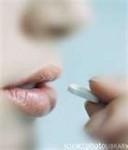Today we’re seeing a tremendous number of women and men who are struggling with hormonal imbalances. Breast cancer to prostate enlargement, PCOS, and menopause symptoms are easily recognizable hormonal symptoms but what about symptoms such as cold hands, irritability, mood swings, pre-menopausal bone fractures, sluggish metabolism (fatigue), thyroid dysfunction, fibrocystic breasts, anxiety, fibroids, irregular menstrual cycles, insomnia and to name just a few?
All of these symptoms can be related to hormonal imbalance and a state known as “Estrogen Dominance” which refers to as a cumulative load of estrogen effects that outpace progesterone.
So how does someone become “estrogen dominant” and how does estrogen affect our overall health? Understanding the causes requires first a look at the most common places we find estrogen and progesterone. Estrogen (E1) is produced mainly in the ovaries. Progesterone is produced mainly from the outside lining of a mature egg released from the ovaries. Women who take or took birth control pills have a unique situation in that they do not ovulate, therefore they miss out on 90% of their body’s ability to produce progesterone. (HRT and even bio/identical hormones also have effects for brevity this article will not cover.) Without progesterone, estrogen can easily dominate. The progestin in birth control pills does not act like natural progesterone our bodies produce. Natural bio-mimicking progesterone can be created from certain yams and soy plants. However, natural progesterone cannot be patented, which is where progestin comes in.
Estrogen can also become a dominant hormone through the exposure to xeno-estrogens (chemicals that act on estrogen hormone receptors). Our environment is loaded with xeno-estrogens in unprecedented amounts. Xeno-estrogens are known endocrine-disrupting chemicals and can be found in:
Body-care products, including ones like sunscreens we coat on our bodies.
Pesticides in our food supply
Hormones used to plump up animals in our meat supply chain
Hormones in our milk supply
Unfiltered tap water can contain synthetic estrogen from birth control pills
Microwaving food in plastic containers releases xeno-estrogens
Some non-stick coated cookware release xeno-estrogens
Plastic water bottles contain xeno-estrogen chemicals
Processed food can contain propyl-paraben a well known endocrine disruptor (Propylparaben is in 49 widely-available processed foods 1)
We can solve this, right? We can drink filtered water, eat only organic meat and vegetables, change some lifestyle habits and our hormones will go back into balance, problem solved. Theoretically, this approach should work, IF the body can detox/eliminate the accumulated toxic estrogen load. Often this load is stored in fat and obesity becomes another factor.
If you see patients with estrogen dominant symptoms, lifestyle changes alone are often not enough to bring the body back into balance. This is where patients need our help. (Additionally, there are other causes of xeno-estrogens this article does not have space to include: i.e. exposure to household chemicals, building chemicals, years of hormone therapy use including bio-Identical/bio-mimicking hormones and even a person’s gut bacteria aka. microbiome.1
Some considerations
Modalities we can incorporate into our health regimes include ways to release the toxic load of estrogen and create a safer by-product during the break-down or detoxing process. Imbalances of hormones directly affect the liver which tends to be on overdrive when symptoms of estrogen dominance are present. Food, herbs and a few well-known supplements are excellent choices to help this process. Improving liver function is fuel for the detoxification process. Consider what “Functional Medicine” has been teaching; when the liver breaks down estrogen (and xeno-estrogens) by-products termed metabolites are formed. Creating a safer estrogen by-product or metabolite should be part of the overall detoxification plan. Excretion of metabolites can be impaired by poor methylation and abnormal gut flora.
A few ways we can help our patients optimize liver function and the detoxification of estrogen:
Chinese herbs formula Jia Wei Xiao Yao San AKA Relax Herb Pack – This popular Chinese herb formula sold worldwide for stress and anxiety outsells all other Chinese formulas, year after year. Stress dramatically affects liver function through continual overproduction of cortisol, rather than progesterone. Since both hormones are derived from the precursor hormone pregnenolone, a situation known as pregnenolone steal develops. When the body determines cortisol is more important to make than progesterone, estrogen dominance can flourish. Treat the liver stress and the downstream effects will improve.
Methionine – This supplement provides sulfur (not the same as sulfa drugs) and acts as a cellular cleanser. It literally donates methyl groups for the biochemical reaction that rids you of poisons and harmful estrogen by-products. Foods can also donate methyl groups a few good ones are beets, legumes, eggs, broccoli, leafy greens, nuts and sunflower seeds.
Methylcobalamin – A form of B12, this supplement also provides a “methyl” group which helps the estrogen detoxification process. Keep in minds, antacids, some diabetes medications, certain cholesterol-binding medicines and alcohol can wipe out your supply of methylcobalamin.
Calcium D-Glucarate – This is not the same as plain calcium. Toxins must combine with water-soluble substances to leave your body. This supplement combines with estrogen to help move it out.
Reishi Mushroom and other Chinese Medicinal Herbs – Reishi is high in poly-saccharides which feed the body’s microbiome, this in turn benefits liver metabolite breakdown.
Fermented foods such as miso soup, tempeh, kombucha, fermented vegetables i.e. pickles, sauerkraut, kimchi. (For more suggestions see my blogs at http://www.PacHerbs.com/blog/)
Keep in mind, reaching hormone balance can be accomplished faster with the elimination and avoidance of xeno-estrogens. However, most functional medicine doctors will agree, diet, supplements, exercise and lifestyle-based strategies are equally important. Establish realistic patient lifestyle goals and together you will be successful in treating the root causes and symptoms of estrogen dominance and create lifelong habits for balanced hormones.
References:
1. Microbiome Researcher, Rob Knight Ph.D. The American Gut Project http://americangut.org/
2. Environmental Working Group. http://www.ewg.org/research/ewg-s-dirty-dozen-guide-food-additives/generally-recognized-as-safe-but-is-it
3. More great info on the human microbiome https://www.youtube.com/watch?v=5DTrENdWvvM



 I’m happy to report that a new menopause treatment will most likely not be approved by the FDA. A panel of advisers to the Food and Drug Administration overwhelmingly voted against a Depomed drug called Gabapentin to treat hot flashes and other symptoms of menopause. Apparently, the benefits were heavily outweighed by the risks involved with this would be prescription menopause treatment.
I’m happy to report that a new menopause treatment will most likely not be approved by the FDA. A panel of advisers to the Food and Drug Administration overwhelmingly voted against a Depomed drug called Gabapentin to treat hot flashes and other symptoms of menopause. Apparently, the benefits were heavily outweighed by the risks involved with this would be prescription menopause treatment.

 China has given us so many incredible jewels of nature in the form of medicinal herbs.
China has given us so many incredible jewels of nature in the form of medicinal herbs.  New evidence now exists about the Chinese herb, Salvia Miltiorrhiza. This herb has been used for thousands of years and has been praised for its benefits for cardiovascular disease. The latest study on Salvia Miltiorrhiza indicates that this Chinese herb can also be beneficial to those suffering with osteoporosis, a thinning of the bones or loss of bone density over time.
New evidence now exists about the Chinese herb, Salvia Miltiorrhiza. This herb has been used for thousands of years and has been praised for its benefits for cardiovascular disease. The latest study on Salvia Miltiorrhiza indicates that this Chinese herb can also be beneficial to those suffering with osteoporosis, a thinning of the bones or loss of bone density over time.

 Menopause symptoms such as hot flashes, night sweats, irritability, brain fog and other symptoms seem to be considered the norm for women over the age of 50, yet this is not true for women around the globe. Researchers from the Department of Integrated Health at Westminster University polled 1,000 British women ages 45 to 55 and compared their answers to those of women from the U.S., Canada, Japan and China. The conclusion was that Japanese and Chinese women suffer the least amount of menopause symptoms. British women suffer the most and Americans are somewhere in between.
Menopause symptoms such as hot flashes, night sweats, irritability, brain fog and other symptoms seem to be considered the norm for women over the age of 50, yet this is not true for women around the globe. Researchers from the Department of Integrated Health at Westminster University polled 1,000 British women ages 45 to 55 and compared their answers to those of women from the U.S., Canada, Japan and China. The conclusion was that Japanese and Chinese women suffer the least amount of menopause symptoms. British women suffer the most and Americans are somewhere in between.